UTVA 75
The UTVA 75 is a compact, low-wing monoplane, piston-engine aircraft manufactured by UTVA. It was mainly used as a military basic trainer and sporting aircraft.[2] Utva 75 aircraft were involved in more than 40 accidents due to various defects.[3] [4] Today, most of the aircraft are decommissioned.
| UTVA 75 | |
|---|---|
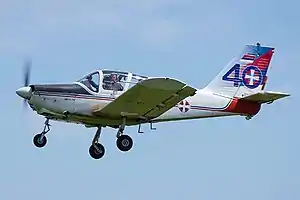 | |
| Serbian Air Force Utva 75 | |
| Role | Military trainer/general aviation |
| National origin | |
| Manufacturer | UTVA |
| First flight | 19 May 1976[1] |
| Introduction | 1978 |
| Retired | 1995 Slovenia, North Macedonia 2003 Bosnia, 2007 Croatia 2012 Montenegro |
| Status | Retired |
| Primary user | Yugoslav Air Force |
| Produced | 1978–1985 |
| Number built | 136[1] |
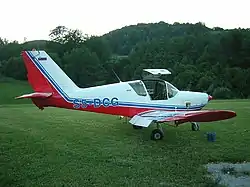
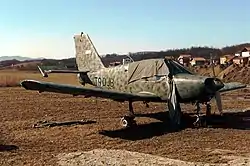
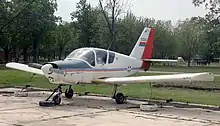
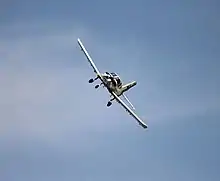
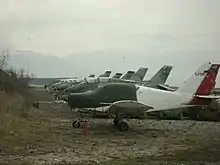
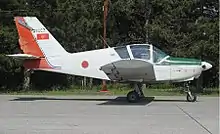

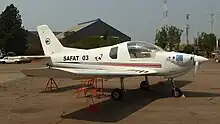
Development
The Utva 75 made its maiden flight in 1976.[1] Between 1978 and 1985, a total of 136 Utva 75s were produced for the former Yugoslav Air Force.[1] Following the breakup of Yugoslavia, many were passed on to successor states.
Design
Designed in 1975 to replace the UTVA Aero 3 as the primary basic trainer in the Yugoslav Air Force. Utva 75 is a low-wing all-metal utility airplane. Wings are cantilever, rectangular with main and auxiliary wing spar and the integral fuel cells located between them. Dihedral is 6 degrees, NACA65 415 wing section.There is one underwing hardpoint on each wing for drop tanks carriage or additional weapon stores. Landing gear is non-retractable with oleo-pneumatic shock-absorbers. It features upward opening gull-wing type access doors to the two-seat side-by-side cockpit. Another characteristic is a row of air scoops, presumably for cockpit ventilation, in the central front frame of the cockpit. The positions of the throttle and RPM levers are changed, which is leading to confusion, in all western aircraft there is a throttle on the left, and RPM on the right on Utva 75 it is exactly the opposite. The cabin doors have a poorly designed closing system, resulting in many doors shattering due to inadvertent opening in the air. However, the aircraft has one of the better suspension systems and even hard landings will turn out soft.
Operational history
The aircraft was operated in the Yugoslav Air force as a basic trainer and it was given in parallel operational use by aeroclubs for the needs of basic training of reserve officers, maintenance of pilot training in the army reserve, air pick-up of mail with anchor, towing gliders and general aeroclub use. The aircraft has proven to be robust but economically very inefficient, maintenance is very expensive for a two-seater aircraft and also fuel consumption is high. It is estimated that the long-term costs are 150% higher than on the Cessna 152. The aircraft flies very slowly, around 160 km/h with a fuel consumption of around 45 liters per hour. When towing gliders, fuel consumption reaches 55-60 liters per hour.[5] [6]
Accidents
Utva 75 aircraft were involved in more than 40 accidents in the territory of Yugoslavia, outside of Yugoslavia the number is even higher.[7]
- 1989 Montenegro, Ivangrad, instructor and student skidded the plane at too low an altitude and died
- 1989 Slovenia, Divača, the pilot overturned the plane at a low altitude and entered a spin
- 1990 Serbia, Kragujevac, plane crashed with fatal outcome
- 1998 Serbia, Crkvine, the pilot overturned the plane at a low altitude and entered a spin, both people on board died
- 1998 Montenegro, Kolasin, the plane crashed, both people died
- 2000 Serbia, the pilot overturned the plane at a low altitude and died
- 2003 Serbia, Kraljevo, the pilot received fatal burns due to a fire on a plane
- 2009 Slovenia, Izlake, the pilot entered a low-altitude vortex, and the pilot and passenger died
Variants
- UTVA 75A11
- Single-seat agricultural aircraft, largely using the Utva 75 airframe.[8]
- UTVA-75A21
- Two-seater with dual controls and provisions for blind instrument flying.[8]
- UTVA-75A41
- Four-seater with advanced avionics, first flown in 1986.[8]
- SAFAT 03
- A development of the UTVA 75 from the SAFAT Aviation Complex at Khartoum, Sudan, with a modified fuselage and tail fin. To confuse matters the Sudanese Government marked up a standard UTVA 75 as a SAFAT 03. One example known, which was displayed at the Dubai Air Show in 2011.
Former operators
- Yugoslav Air Force → partially handed over for use to aeroclubs
- Slovenian Air Force[10] → handed over entirely to aeroclubs for use
- Letalski center Maribor Civil operator (1989-2022)
Specifications (UTVA 75A21)
Data from Jane's All the World's Aircraft 1988-89 [8]
General characteristics
- Crew: 2
- Capacity: 210 kg (460 lb) max
- Length: 7.11 m (23 ft 4 in)
- Wingspan: 9.73 m (31 ft 11 in)
- Height: 3.15 m (10 ft 4 in)
- Wing area: 14.63 m2 (157.5 sq ft)
- Aspect ratio: 6.5
- Empty weight: 685 kg (1,510 lb) equipped
- Max takeoff weight: 960 kg (2,116 lb)
- Fuel capacity: standard:160 L (42 US gal; 35 imp gal): with drop tanks 360 L (95 US gal; 79 imp gal)
- Powerplant: 1 × Lycoming IO-360-B1F 4-cyl. air-cooled horizontally-opposed piston engine, 134 kW (180 hp)
- Propellers: 2-bladed Hartzell HC-C2YK-1BF/F7666A variable-pitch metal propeller
Performance
- Maximum speed: 215 km/h (134 mph, 116 kn)
- Cruise speed: 165 km/h (103 mph, 89 kn)
- Stall speed: 95 km/h (59 mph, 51 kn) flaps up at idle
- 82 km/h (51 mph; 44 kn) 25° flap at idle
- Never exceed speed: 270 km/h (168 mph, 146 kn)
- Range: 800 km (500 mi, 430 nmi)
- Ferry range: 2,000 km (1,200 mi, 1,100 nmi)
- Service ceiling: 4,000 m (13,000 ft)
- g limits: +4.4 -2.2
- Rate of climb: 4.5 m/s (890 ft/min)
- Takeoff distance to 50 ft (15 m): 501 m grass at Sea Level
- Landing distance from 50 ft (15 m): 450 m grass at Sea Level
Armament
- Hardpoints: 2 with a capacity of 150 kg (330 lb) each, with provisions to carry combinations of:
- Rockets: 2x RL 128-02 128 mm (HVAR-5) or 2x rocket launcher with 12 rockets 57 mm
- Bombs: 2x 120 kg bombs or 4x 50 kg bombs
- Other: 2x MAC-AA-52 container with 7,62 mm or 2x cargo container 100 kg capacity or 2x drop tanks
'
Avionics
- standard (model 75) KING KR85 ADF and KING KY 195B
- optional (model 75A catalog only) KING KR87 ADF, RNAV KING KNS81 VOR/LOC: KING KN 53, KING KY 197 Indicators: HSI KING KI 525A, and RMI KING KI 229, DME:KING KN 62A, Transponder: KING KT 79, Audio panel: KING KMA 24
References
- "Školski avion UTVA-75". Vojska Srbije. Retrieved 10 July 2013.
- Dusan. "Утва 75". www.vazduhoplovnetradicijesrbije.rs (in Serbian). Belgrade. Retrieved 26 February 2015.
- "Letelice UTVA 75 u sastavu RV i PVO i njihove sudbine".
- "UTVA 75 u sastavu RV i PVO i njihove sudbine".
- "Vazduhoplovnetradicijesrbije.rs".
- "Vojska Srbije Školski avion Utva 75".
- "Aviation Safety Network Utva 75".
- John W.R. Taylor, ed. (1988). Jane's All the World's Aircraft 1988-89. London: Jane's Information Group. pp. 499–500. ISBN 0-7106-0867-5.
- "Eurofighter: Dubai Air Show 2011". Eurofighter. 17 November 2011. Archived from the original on 15 May 2013. Retrieved 10 July 2013.
- "World Air Forces 1997 pg. 621". flightglobal.com. Retrieved 3 May 2019.
- "World Air Forces 1997 pg. 71". flightglobal.com. Retrieved 3 May 2019.